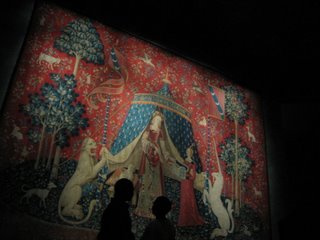Not long ago I did a post on the role of creativity of Satan.
But recently I have been thinking of the Creativity of God and how humans use the creativeness He has given us. As stated, we are made in the image of God, who is the Creator. So, naturally, humans have creative powers and almost a need to create. But not everything we create is good, as in the case with God.
A couple of questions (of which I truly do not know the answer).
1. Does God still create? When we think of God, and put a definition on Him, we usually include Creator. But do we keep God's creativeness in the past? If we say God still creates, do we limit him to just babies? What is God's role today as Creator? 2. Concerning fantasy, where is the line when it comes to made up worlds? Of course, we have the appraised Chronicles of Narnia and the Lord of the Rings. And just because someone can think it up does not make it holy. So, these examples show how fantasy can be "used" to speak of God. I know anything can be used for or against God's glory. But that is not quite my question. What about "creatures" made up that is completely imaginary, such as elfs, gnomes, trolls, fairies etc? I am guess someone will point to Monsters Inc. Fine, but it does not answer my particular question. How can man's creations be considered either good or evil? I know this is not a clear question. And the question may seem to have already been answered, but I am not sure, it has been explored well (or at least I have not thought about it enough to satisfy my curiosity).
2. Concerning fantasy, where is the line when it comes to made up worlds? Of course, we have the appraised Chronicles of Narnia and the Lord of the Rings. And just because someone can think it up does not make it holy. So, these examples show how fantasy can be "used" to speak of God. I know anything can be used for or against God's glory. But that is not quite my question. What about "creatures" made up that is completely imaginary, such as elfs, gnomes, trolls, fairies etc? I am guess someone will point to Monsters Inc. Fine, but it does not answer my particular question. How can man's creations be considered either good or evil? I know this is not a clear question. And the question may seem to have already been answered, but I am not sure, it has been explored well (or at least I have not thought about it enough to satisfy my curiosity).
Sunday, November 05, 2006
Creativity of God the Creator
Tuesday, August 22, 2006
Logos, Mythos, and Ethos

I believe it was Aristotle that proposed that a speaker must have logos, ethos and pathos in order to communicate effectively. As I try to remember lectures from my college speech classes, it seems the logos was the appeal to logic and reason. Ethos was the general character of the speaker. The audience must feel that he has their best interest when he speaks. And pathos was the appeal to the emotions. (While writing I found this short explanation)
Recently, I have been thinking about three other -oses(technically -oi). Logos, Mythos, and Ethos, but in a very restrictive sense. (As a background note, this is not a well researched entry, just my opinion. My former profs will be horrified at my lack of scholarly application to Greek Word Studies.) While logos, mythos, ethos, and even pathos are in the Greek Bible, these words have evolved both into Koine language and out from Koine.
Recently, I was visiting a book store and ran across a book about Megatrends of Europe. Interesting theories, and besides, what do I know about trends and trying to evaluate them? But it got me thinking more about something I had been mulling over in my mind.
How do myths effect behavior? We all believe in myths (what I will call individual mythos and collective mythos). For example we all believe something about the origin of the universe as well as human origin. As Christians our collective mythos (of which our Jewish friends share) is the Genesis account.****Now, before I am hung up by the highest tree or burned at the stake for heresy, let me state that when I use the term mythos, I am using the term in a pretty strict sense, that is how one explains things around them. The mythos could be true or not. In the modern era, no one "believes" the Greek or Roman mythoi, but it was an explanation of things. But for the record I have no problem "believing" the mythos, stated in the book of Genesis, to be true***** One modern mythos would be the classic Darwin explanation of origins. And yes, I am calling Darwinism a myth, a modern myth though. I am not saying it is "true" or "false," I am just saying it is a myth. In fact, I will go so far as to say that Newton's "laws" of physics, which have been tested and assigned the name "law," are myths. They explain why things act in a certain way.
We are so used to understanding "myths" as pre-modern explanations of the world that to even suggest a myth exists in the modern or postmodern world is akin to blasphemy. So be it. This is why when one talks about the Bible containing myths, some feel uncomfortable. Myths=untrue. So to call anything in the Bible a myth usually means saying it is not true. Again, I am not saying anything about the veracity of myths, I am just defining them (And again, I have no problem believing the Creation story in Genesis to be true).
So, in community and as individuals we have and need myths.
How are the mythoi (plural of mythos) formed? Mythos come from the Logos. We get all sorts of concepts from the word logos. There are "logic," "reason," "word," "thought," and etc. etc. So, if one will, behind every explanation (mythos) of how things are is a reason (logos). Logos ,then, precedes mythos.
Since myths exist how should we then act, what is the ethos? If one deems the myths as logical, then one will act according. Behavior follows belief. Of course, I can not think of an example to illustrate this. Thereore, until I can, I will have to concede the point of any relationship between mythos and ethos.
But, if there is a connection, the logos (word, thought, reason) creates what we see and feel and touch and smell and hear (as well as what we can't see, feel, touch, and hear). Since, in the case of origin, we are what the Logos has created, we are allowed with our own logos to create the explanation (our mythos). Sometimes our "creation" is based on revelation, and sometimes not. The mythos does affect (and we can see its effects also) how we behave (our ethos).
If the natural world is all there is, let us eat and drink; for to morrow we die.
PS Realizing this is a pretty poor attempt at explaining what was in my head.
Tuesday, June 06, 2006
666
Oh yeah, all the buzz is about the 6th day of the 6th month of the 6th year of the 21st century.
But is there anything to really be buzzing about?
The number shows up in the Christian Bible in the Apocalypsis of John the apostle (known as the book of Revelation). Rev 13:18. It is equated with the number of the beast. The beast is against anything and everything of Christ.
But what is the reference? I've heard everything from Napoleon to Hitler to Kaiser Wilhem to Nero. All based on the number being 666. My favorite is the vav-vav-vav sequence in which the Hebrew becomes www. So, the internet is the devil. Haha.
Recently, earlier and better manuscripts indicate that the number of the beast is NOT 666 but in fact 616. And as of yet, I have not heard any new gematria games being played with the real mark of the beast (616).
Therefore, no knows who or what the mark of the beast refers, except that it refers to the one who comes in place of Christ, or simply the beast. That's all we know.
So, no need to fear 666 anymore. However, I have a feeling the world will be reeling from anything associated with 666 for many years to come. It's tradition.
Tuesday, April 04, 2006
Atheist's Mass
Afterwards, I decided to take in a short story by Honore de Balzac. I cheated because I read "The Atheist's Mass" in English (but the English seemed difficult also, who knows when it was translated). The title caught my attention, and when I started I had no idea what I would find. Would this be a sure slam against Christianity (religion) or what? Anyway, I enjoyed the story, but I am not quite sure what the main point was. Maybe you can help me? I always struggle with literature, just ask Lady R (and my mom who has helped me with a couple of my classics in high school).
Here is a somewhat short synopsis of the plot. There is a surgeon Dr. Bianchon who was the assistant to Dr. Desplein. Now, this Dr. Desplein was at one time famous but after his death, his fame faded. Dr. D was a hard core atheist and an excellent surgeon in his day. Dr. B became his assistance and the two men became great friends. One day Dr. Bianchon saw Dr. Desplein enter a church to what seemed to be for mass. This act confused Dr. Bianchon. Why was such an atheistic man going to church? So, the next year he noted also that Dr. Desplein went to mass on the same day. Dr. B went to the church leaders and found that Dr. Desplein had actually paid for this mass and four times a year he went to church when this mass was presented. One day Dr. B asked Dr. Desplein what he thought about the mass in general. Dr. Desplein said:
A farce,” said Desplein, “which has cost Christendom more blood than all Napoleon’s battles and all Broussais’ leeches. The mass is a papal invention, not older than the sixth century, and based on the Hoc est corpus. What floods of blood were shed to establish the Fete-Dieu, the Festival of Corpus Christi—the institution by which Rome established her triumph in the question of the Real Presence, a schism which rent the Church during three centuries! The wars of the Count of Toulouse against the Albigenses were the tail end of that dispute. The Vaudois and the Albigenses refused to recognize this innovation.
So, this response brought about more contradictions. Finally, Dr. B. asked Dr.Desplein about this. Dr. Desplein told a long story about the poverty of his youth. He poured himself into his scientific studies to become a surgeon. One day his neighbor Bourgeat informed him that they both were being evicted from their apartment. Bourgeat offered the use of his cart to move both men. They decided to try and find an appartment together. Even though Bourgeat did not have much money, he believed in what Desplein was doing and saved his money to invest in Desplein's studies. Later, when Desplein becomes a famous surgeon in Paris, Bourgeat fell sick. Bourgeat was a man of faith and asked if Desplein could secure the clergy for his death. Thus, out of respect for Bourgeat,Desplein went to mass four times a year.
The question with what the reader is left is did Desplein believe.
"Will not those who believe like to fancy that the humble Auvergnat came to open the gate of Heaven to his friend"





